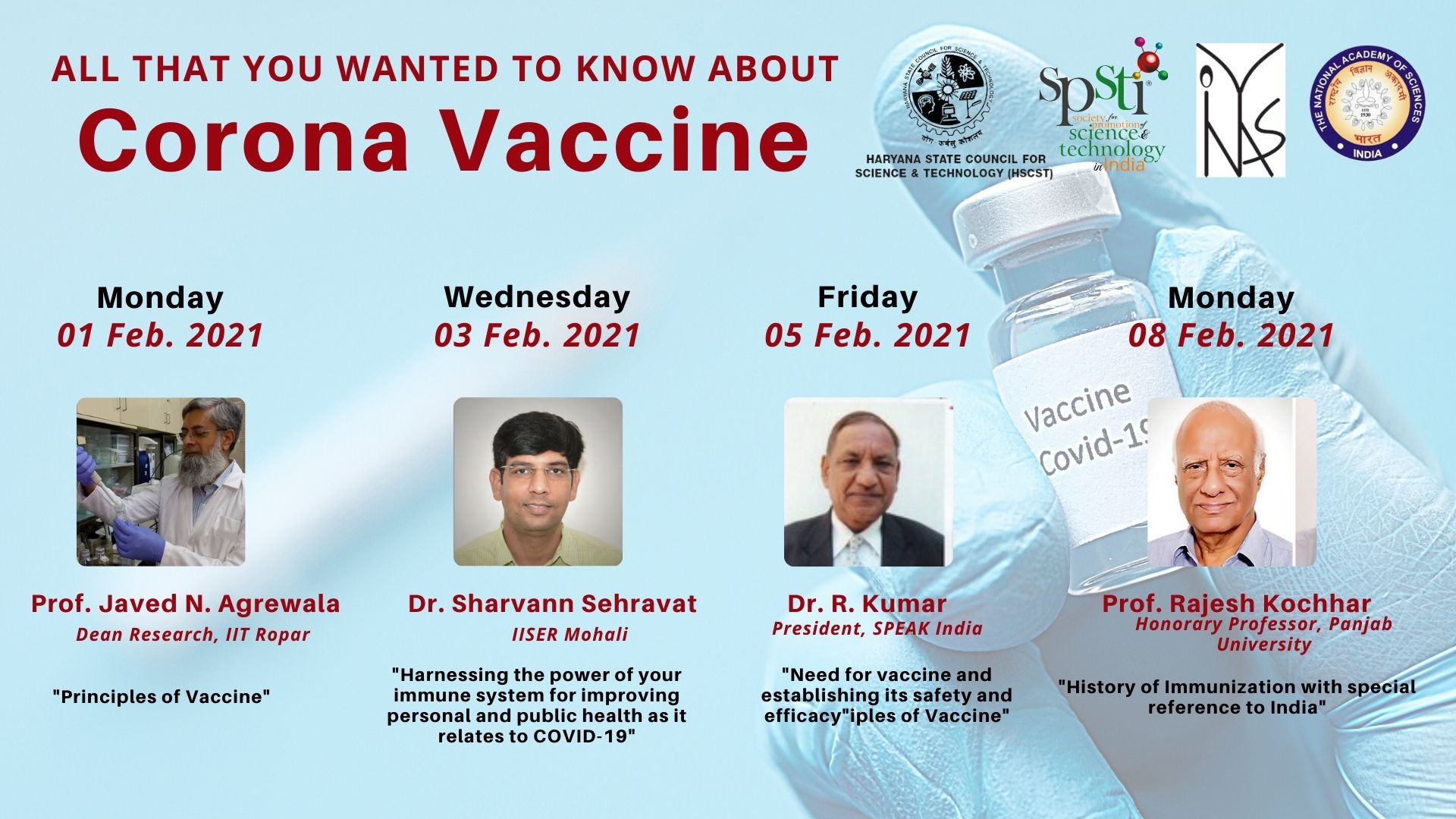The Society for Promotion of Science of Science & Technology in India (SPSTI), in association with Indian National Young Academy of Sciences and Chandigarh Chapter of the National Academy of Sciences, India with support from Haryana State Council for Science, Innovation and Technology has organized a series of talk on “All you want to know about Corona vaccine”. The first session of the series was conducted on “Harnessing the power of your immune systems for improving personal and public health as it relates to COVID-19” on February 03, 2021 at 2.00 pm through online mode. The session was attended by more than 60 participants on the zoom and about 229 viewed the same on the Facebook page of SPSTI.
The session steered with the introduction of the series by Prof. Keya Dharamvir. Dr. Neha Sardana gave the opening remarks and introduced the speaker, Prof. Dr. Sharvan Sehrawat, Associate Professor at Biological Science, Indian Institute of Science Education & Research (IISER), Mohali.
Dr. Sehrawat began with talking about many epidemics like smallpox, black death, HIV, spanish flu, swine flu that has killed many people around the globe. The treatment has become more frequent and apparently more people are dying with the new pandemics. He explained we as hosts are constantly exposed to many infectious agents that we are to handle these, and many we don’t. But when there are ecological disturbances, more of these pathogens start encroaching our area and in reverse encroach their areas, resulting in us getting exposed to infectious diseases, and many of them we are not able to handle and leading to pandemic, the recent being COVID-19. He further said there will be more pandemics in future and depending on the treatment being coming up depends whether COVID-19 will remain or not and it may take a year or two until we return to pre-COVID-19 lifestyle. He further said most people are not efficient spreaders of COVID-19 and almost 80% of transmission is by less than 10% of cases called super spreaders and close exposure to symptomatic persons increases the chances of spreading infection. Exposure to non-symptomatic infectious persons and to contaminated surfaces is extremely low. The major reason for transmission has been identified is person-to-person contact. There have been seven known human tropic corona viruses but only three have caused severe epidemics. He further explained the mechanism of invasion and multiplication of coronavirus in the human body and causing infection. The further transmission of these viruses is by aerosol and droplets size 0.1-1000 micrometers of which the intermediate size of 0.4 micrometer are more dangerous as they escape the upper respiratory tract and settle in lung tissues and bypass innate immune activation. He explained the mechanical and chemical barriers, innate immune defence mechanisms and adaptive immune response as three lines of defence in human beings. He explained lymphoid stem cells generate memory cells to encounter against any foreign body. Sharing various research studies, diagrams and graphs he discussed in detail about host responsiveness to viral infection from an immunological perspective, where interferon plays a major role in fighting against viruses. He shared results from the experiments his team conducted and found aged individuals are at higher risk of getting the viral infection as they fail to mount any interferon response. Also, the males are more susceptible to certain viruses than females. He further talked briefly about immunization giving details of the history of vaccination. Vaccination has helped to significantly reduce the cases of infectious and deadly diseases in the world and has also eradicated many such diseases from the face of the earth. Developing vaccines is a long process following various phases. The vaccines for COVID-19 include RNA vaccines, recombinant protein vaccines and inactivated vaccines, which though developed in a very short span of time due to the emergency conditions but vaccines are the most potent biological agents that have saved more lives than any other form of intervention.
The session was much appreciated by the audience and followed with questions about effectiveness and risks of COVID-19 vaccine over a period of time. Prof. Arun K. Grover, former Vice Chancellor Panjab University and Vice President SPSTI presented the concluding remarks. Dr. Neha Sardana thanked the speaker as well as the audience. The next two lectures in the series will be on February 5 and 8, 2021 and can be watched live at 2.00 pm on SPSTI Facebook page.

